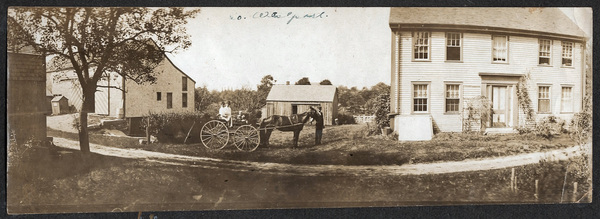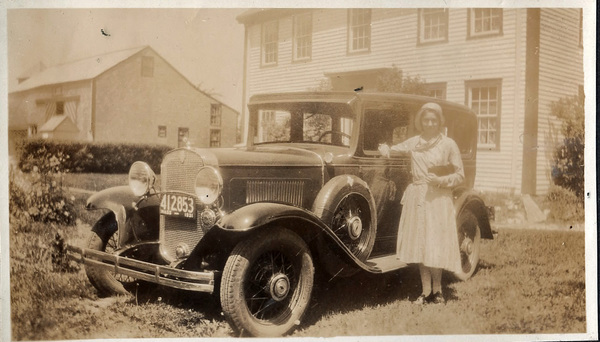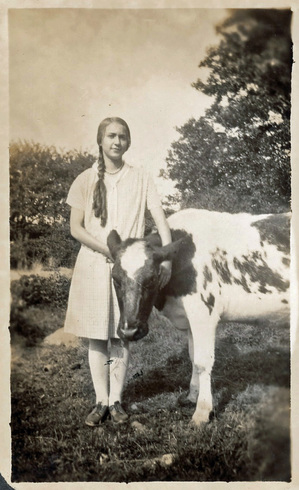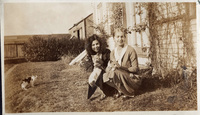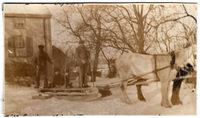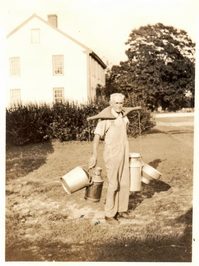“Use it up, wear it out, make it do, or do without”
Posted on October 24, 2013 by Jenny ONeill
“Use it up, wear it out, make it do, or do without”
Born in 1914 and still going strong, Elvira Smith reflects on her childhood and what it was like growing up on a Westport Farm located on Horseneck Road, down a long lane.
Growing up on a farm was a lot of hard work but remains one of my fondest memories.
There was always a lot of work to be done on the farm. I often worked with my Pa outside, cutting and storing hay, cutting and lugging green feed for the calves and heifers, planting potatoes, and beets, etc. It was also my job to take the horses and cows to the spring brook for a drink and drive them back to their pasture or to their barn. Something important that I learned was to always be careful where I was to place my feet! If you could not find me out in the fields with my father, you could find me feeding the chickens, collecting their eggs, or shutting them up in their hen coops at night.
Except for one summer, I remember I did all the canning by myself. Of all things, that was the year the canning closet fell over and a lot of my work was for naught. The jars ended up draining through the dirt floor of the cellar.
Esther also did a lot of needlework, and with my mother, made most of our clothes. We were very frugal. For example we would use the cotton from the flour sacks to make our aprons. I remember that instead of throwing our old sweaters away, we would unravel the yarn, then wash and clean it to take out the wrinkles. I still have two vests that I knitted from old sweaters. My mother had the expression “Use it up, wear it out, make it do, or do without”. We lived by that slogan then and I still do now.
That slogan definitely helped us through the Depression. Because we lived on a farm and had plenty of vegetables, fruit and even chickens, we were self-sustaining through the depression. Although, I did become very tired of chicken! We ate differently on the farm. For instance, we never ate raw peppers. They were always fried. Rice was used mostly for rice pudding. Corn was a meal, not added to a meal, and with the first crop of strawberries, we had strawberry shortcake for our dinner, and said a “hurrah” the garden season has arrived! We had plenty of raspberry and blueberry bushes on the farm. I had great fun picking several buckets with my sister and it was a good change from being in the fields with my father; not to mention how much we looked forward to blueberry pie! A relish that always accompanied our bean supper was raw onion sitting on the table in a saucer with vinegar, and, always a piece of salt pork could be found in the baked beans. Our cows provided cream, milk and cottage cheese which were stored in my Uncle John’s spring house which was located over a spring brook in between our farms. We also had a root cellar to store our winter vegetables.
We only had one farm dog. His name was Breame, a Scottish name. Our horses were part of the working force on the farm. Bell was our best work horse; Bess was the friskiest, while Kate just plodded along. Later on, we had Donald and Billy. We always had cats as they kept our grain room free of mice. “Buffie” was our best mouser. I can envision him now sitting in the grain room watching my father move the grain bags. When my father saw a mouse he would point it out to the cat and the cat would pounce on the mouse and catch it for us. The cats were not just farm animals; they were our pets and friends as well. Ambrose was a favorite cat. I remember one night she came to the front door and kept calling and calling. I finally went downstairs to pet her and to find out what the ruckus was all about. There she was a proud as could be showing me a mouse that she had just caught. I petted her and went back upstairs to bed but she did not leave and continued calling and calling until I went back downstairs. I took the mouse by the tail and dangled it in front of her, praised her, and gave it back. She was then satisfied and went on her way. She just wanted to be sure that I knew that she had brought me a special gift.
One memory I do not cherish is that the back of our “out house” was situated to the North. Boy, that North wind could get mighty cold! Oh, and I would rather not be reminded of having to use a chamber pot in the winter time, then empting it in the morning.
I remember one day my sister Esther and my cousin Jane and I were wandering around the ruins of the old George Edward Handy house, which was the property next door to us, and found a working still. Janie, who was quite a few years older than us, came up with the idea to toss an old water kettle into the still to show her protest and to let whoever was making the moonshine, know that they had been discovered. Those were the times we would often hear the rum running wagons go by in the middle of the night.
When I was sixteen my father told an auto dealer in town, Mr. Davis, that if he could get me through acquiring an automobile license, he would purchase a car. As a result, my father bought a 1930 Chevy. He then gave up driving. At the age of sixteen, I became the driver for the family. One day I remember my mother and I were driving to Swansea for a high school football game and came to a stop sign. One of my fellow students, Wordell Sampson, drove up next to me getting ready to pass. My mother baited me and said, “You aren’t going to let him pass you, are you”? That was all I needed. I took the challenge and left him behind! I was the only one in the family with a license for years. Currently my license shows a hundred year span, from my birthday, 1914, to 2014, the expiration date. On my hundredth birthday I hope to drive one last time. Watch out everyone!
When my high school graduation came around it was very exciting to go into the city and be able to buy two dresses, new shoes, a handkerchief, stockings and undies. One dress was for the school dance, and one for the graduation. It was also a special day to celebrate because I was chosen as Salutatorian for my graduating class of 1932. For an extra special treat my parents purchased some flowers, and also let me get a “finger wave”, which was one of the first developed permanents. My friend Hazel, who worked at the Star Store, made the arrangements. My father would not let my mother ever cut my hair so when I had my “finger wave”, it was quite a job for the hairdresser as my hair had grown so long I could sit on the ends. The year after I graduated I noticed an article in the newspaper of the “Sewing Circle” column where someone had written in and commented how costly it was for a graduation. I wrote an article in response listing all the expenses for my graduation showing that it did not have to be so costly.
Some of my fondest memories are working with my father on the farm. I believe all that hard work contributed to my physical strength and character lingering throughout my long life, even to now, at my age of 99. My parents were very loving and wise and taught me how to get along in this life by hard work, minding my own business and keeping my mouth shut! We lived on the farm until I was 24. Upon my father’s passing, we sold the farm and move to Dartmouth in 1938, just prior to the infamous ’38 Hurricane. However, home for me will always be Westport and is closest to my heart!!
Wouldn’t you like to live on a farm like in the old days!
Our thanks to Elvira Smith and Emily Edwards for this article.

